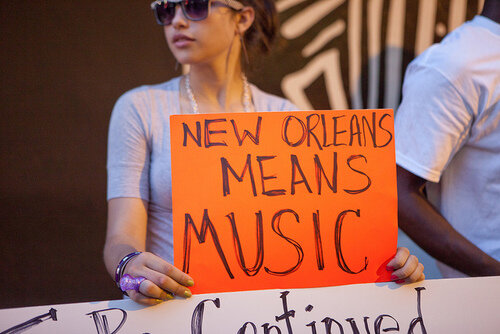Noise Has Another Set of Essentials

MaCCNO weighs into the noise conversation with "A Noise Ordinance for All New Orleanians."
[Updated] The Music and Culture Coalition of New Orleans (MaCCNO) joined the noise ordinance conversation yesterday when it released "A Noise Ordinance for All New Orleanians," a statement that outlines what it believes to be the essential characteristics of a successful noise ordinance. Yesterday, the MaCCNO wrote:
Music and performance are the backbone of our city and they drive our local economy. Live music draws millions of tourists to the city every year, attracts new residents and investments, and enhances real estate values in neighborhoods of cultural and musical vibrancy. A comprehensive noise ordinance that threatens the distinctiveness of New Orleans threatens our quality of life, the long-term economic growth of the city, and the everyday ability of thousands of our residents to earn an income.
The document follows on the heels of "Seven Essential Items," a statement of noise ordinance must-haves announced a couple of weeks ago by a coalition of neighborhood associations including the Vieux Carre Property Owners, Residents and Associates (VCPORA), who have a history of taking strong stances to preserve the residential nature of the French Quarter.
That coalition listed of its members, prematurely including the Broadmoor Improvement Association and the Faubourg Marigny Improvement Association (FMIA). The former withdrew its support after its name was included based on the agreement of one board member and not a vote by its board, and the latter had concerns about the mention of "amplified noise" and how it could affect a number of businesses in the neighborhood.
MaCCNO's leadership comes from the music community, but its proposals and the "Seven Essential Items" share some priorities. Both call for neighborhood involvement in the process. According to today's MaCCNO statement:
Regulations should be appropriate to the individual character and soundscapes of the city's diverse neighborhoods, communities, and traditions. Such policies must be created and enforced with the input of residents, neighborhood associations, businesses, performers and cultural workers. (I've stated my thoughts on this before)
Both groups see a need for better, more consistent enforcement. MaCCNO echoed the "Seven Essential Items" when it wrote:
New Orleans needs a dedicated office directed with handling noise complaints that is both accessible and accountable. It is integral that this office be tasked with providing outreach to residents, businesses, performers, cultural workers, and other members of the cultural community about rules and regulations. This office must also take the lead in starting and fostering any mediation necessary to bring all involved parties to a mutually satisfying resolution of issues. (I've commented on this position here.)
However, the organizations differ on how to deal with those who violate the noise ordinance. The neighborhood coalition believes the way forward is punishment heavy enough to leave a mark:
In order to impose penalties that will deter repeat offenses for abuse of sound ordinance standards, pass state legislation to allow higher or unlimited fines. In the absence of this legislation, consider other deterrents such as limited operating hours or complete shut down of the offending establishment.
MaCCNO advocates mediation instead.
Noise complaints should lead to a formalized mediation process rooted in the involvement of concerned residents, neighborhood and community groups, affected performers, cultural workers, and local businesses. Criminalizing live music is neither a good neighbor policy nor a good economic policy in a city that thrives on the availability, diversity, and innovation of performance.
The two list of essentials come from different priorities. The "Seven Essential Items" treats everything over a given decibel level as noise, no matter how it's created. MaCCNO's essentials seeks clarification of the rules by which music can be made. A passage on street performers calls for clear guidelines for hours and sound levels for street musicians, and another asks for a noise ordinance that codifies the place of the second line.
The FMIA has made it clear in a recent letter that it will consider all noise-related proposals. Its board wrote Hannah Kreiger-Benson, facilitator and spokesperson for MaCCNO:
The FMIA is keenly aware of the need to have a simpler noise ordinance that could be enforceable to ensure the quality of life of residents, while not imposing an unfair burden on law-abiding businesses that are not the source of excessive noise. The FMIA supports the efforts of any group engaged in the discussion and dissemination of constructive ideas on the issue of music, noise, and quality of life.
The irony of this situation is that the haphazard nature of enforcement in recent years has helped create the escalation of volume in the French Quarter and the feeling of harassment and persecution that accompanies that rare enforcement. It has pitted neighbors against neighbors through inaction, but unless the city changes in this area, MaCCNO and the neighborhood coalition will have another thing in common. They'll both have written meaningless documents.
Updated 11:54 a.m.
In the first version of the story, the concerns of the FMIA were misrepresented. The text has been changed to correct this error.
Updated July 3, 10:13 a.m.
The spelling of Hannah Kreiger-Benson's name was corrected.






